
What do BigCommerce and Shopify do
BigCommerce and Shopify are cloud-based solutions designed as online store builders that help businesses to sell items online and develop their stores. The platforms do not demand a large budget for store development. Both platforms provide a DIY, Do-It-Yourself, approach — pick a template, upload content, create product cards — you are all set!
Also, there is a trial period — you can use the platforms free for two weeks. Both platforms are 'Software as a Service' (SaaS) solutions, which means that you don’t have to install anything on your computer, as everything runs safely on the cloud. The only thing you need to operate your online store through these platforms is an internet connection.

The platforms allow you to kick off the launch of an online business from scratch in just a few days without any coding skills. In the beginning, setting up and running the site can be done by a non-technical person. Certainly, if you’re not an advanced user and need to add some special features to your stores, such as custom design, specific analytic reports or unique functionality — you need to hire a Shopify developer.
Let’s take a closer look at the platforms' functionality and differences, particularities of use, pricing models, range of plugins and SEO abilities, as well as marketing and selling features. Stay tuned and this article will help you to choose the right one for your e-commerce website.
Bigcommerce vs Shopify Main Features
Understanding the distinctive features will help you to define which, Shopify or BigCommerce, is better suited for your specific business needs and matches with the specific scenario and types of your users.
Pricing
Shopify pricing plans
The platforms offer flexible pricing. The more advanced tariff plan you choose, the more extra tools you will be provided. The platforms maintain a system of discounts.
Shopify provides 5 pricing plans. Shopify’s prices, depending on the plan you choose, will be from $29 to $299 per month. Shopify has such payment options as Basic, Shopify for growing business, and Advanced. Also, Shopify provides a solution for high-volume merchants Shopify Plus. There is also Shopify Light (Shopify button), a tariff plan for quickly adding your products to any website or blog. The Shopify button can be added for $9 monthly. It will give direct-purchase excess to the item from any page. To help you decide on which tariff plan works best for you, Shopify offers a 14-day free trial period for its users.
BigCommerce pricing plans
The difference between Shopify and BigCommerce tariffs is less than 1$. You will pay from $29.95 to $299.95 monthly for BigCommerce’s usage. Four pricing options are available – Standard, Plus, Pro, and Enterprise. You can use a ‘Buy button‘ option at BigCommerce only after installation. 10% discounts will be available for you at Bigcommerce in case of choosing the annual base payments and paying upfront. You can check here to read about a 15-day free trial.

Here is an important note about scaling your business and sales with BigCommerce: for Standard and Plus Plans, e-store sales should less than $50,000 and $180,000 a year respectively. Then, if you sell more you’ll need to upgrade to the Pro Plan. The Pro Plan costs $299.95 if your store brings in no more than $450,000 a month. And, finally, you’ll pay at least $150 more per month for each additional $200,000 in sales.
Both solutions provide such a useful option as an ‘abandoned cart recovery’ feature. You can find it in Shopify’s Basic Plan and BigCommerce’s Plus Plan.
Comparing such additional options as theme prices, BigCommerce offers themes at a higher price than Shopify – the average price is $250-300, compared to the standard $180.
SEO optimization
Both platforms do well with SEO. You can use the benefits of good SEO performance such as easy changing of page titles and meta descriptions, adding headings and alt text. You can also effortlessly manage redirects, which are important for search engines to identify your page after changing its URLs. Shopify even automatically prompts you to do that. Both platforms provide a free SSL certificate to get a high score in Google ranking systems. Comparing Bigc vs Shopify, BigCommerce is slightly ahead in SEO, as links can be made shorter and more readable.
By choosing either of the platforms, you can be sure you will get all the necessary tools for high-quality SEO optimization of your site. You can easily use as many keywords as you need, improve your titles and descriptions, optimize search engine bots and also prevent content duplication. However, it is important to note that getting good SEO results demands investing time or money in such parts of SEO strategy as link building, on-page SEO, and keyword research.
API
Both e-commerce solutions include an Application Programming Interface (API), which allows interacting with other software products. Both platforms provide a considerable scope for development and are equipped with a GraphQL API. This tool provides a more flexible way of configuring requests and helps to receive necessary data. Both of them can develop a third-party Storefront application using REST API and manage admin data, orders, products, and users.
In comparing Shopify and BigCommerce, the Shopify’s API has more benefits as it is described in detail and is easy to understand. It is not to mention that Shopify has a large community that helps to resolve issues quite fast. In our recent article, we have collected the technical and economical advantages of the headless Shopify approach that can help you to find more details on how to benefit from the Shopify platform.
Website loading speed
Speed is a highly important indicator that affects the development of your online business. This indicator is a key factor not only for a better user experience, but also for good search engine optimization. If each step takes more than a couple of seconds to load, you are at risk that your client will leave the website and never return.
Furthermore, Google too takes into account the website loading speed. Higher speed will help the store to appear higher in specific keyword search results and your store’s pages will be visible to every eye.
Shopify takes first place amongst the E-commerce platforms at this rate. Its average page load time is 1.3 seconds, while BigCommerce sites' average load time is 2.2 seconds.
You can find many E-commerce solutions that provide high-speed loadings only for additional payment. Shopify and BigCommerce provide good page loading speed even in basic plans.
Range of plugins
Both BigCommerce and Shopify propose a huge variety of plugins. Why do you need them? They will help you to:

Shopify has a slightly more mature third-party ecosystem. You can find nearly 4000 different plugins on Shopify, over 1500 of them are free. They will help to reduce the time on your daily tasks, add special features to your site, attract visitors and increase sales. However, their installation will make your speed lower, so choose only what you need.
BigCommerce is quite a young platform, so there are about 930 integrations only. Still, the main integrations of large companies such as Yotpo or TrustPilot exist for BigCommerce as well.
Community
Merchants trust their business to Shopify and BigCommerce platforms. Speaking about well-developed communities, let’s also consider the market shares and domain of each platform.
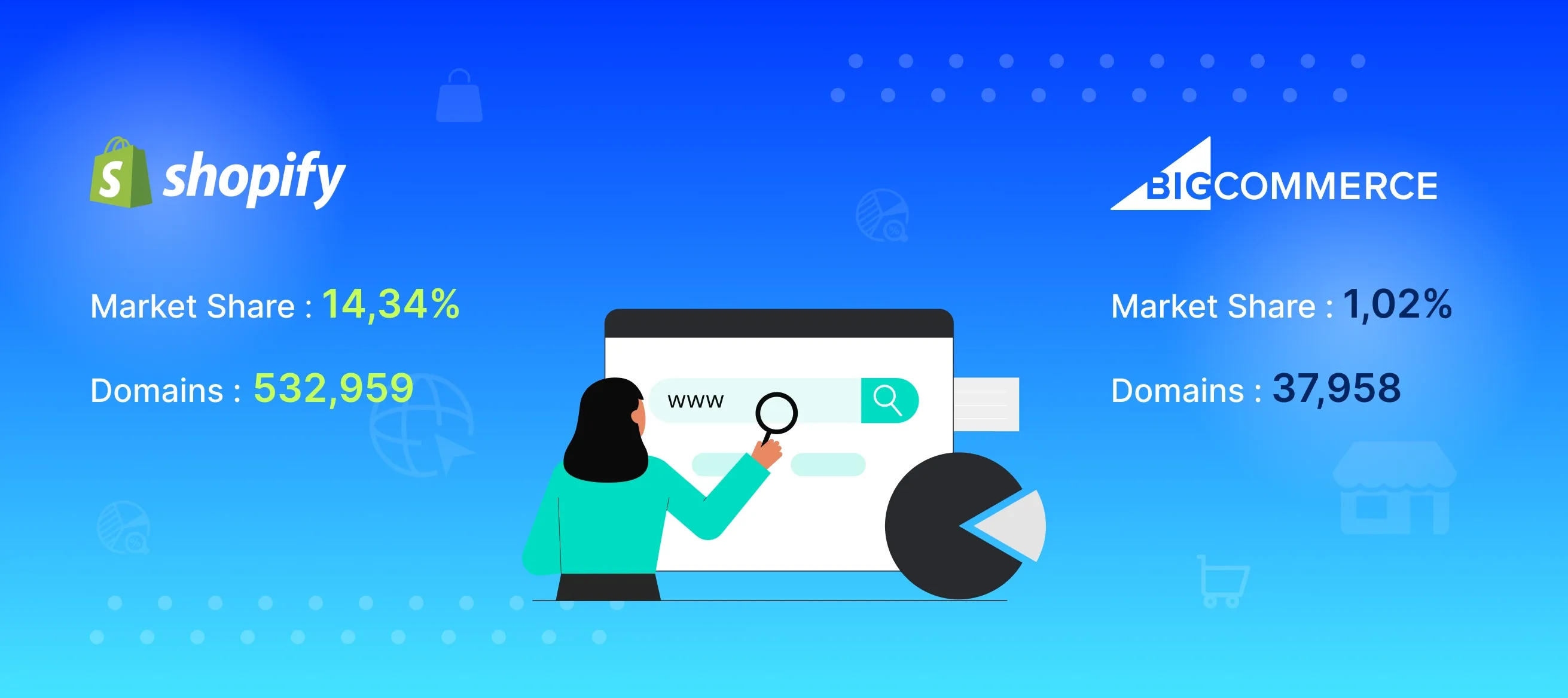
When it comes to BigCommerce vs Shopify review, you can find broad community support at both platforms. They will help you to find answers on how to work with the platform, make customizations and improvements.
By choosing Shopify, you will be able to join a supportive community of designers, developers, and freelancers who are the experts on Shopify and ready to extend a helping hand. Now the community counts about one million users.
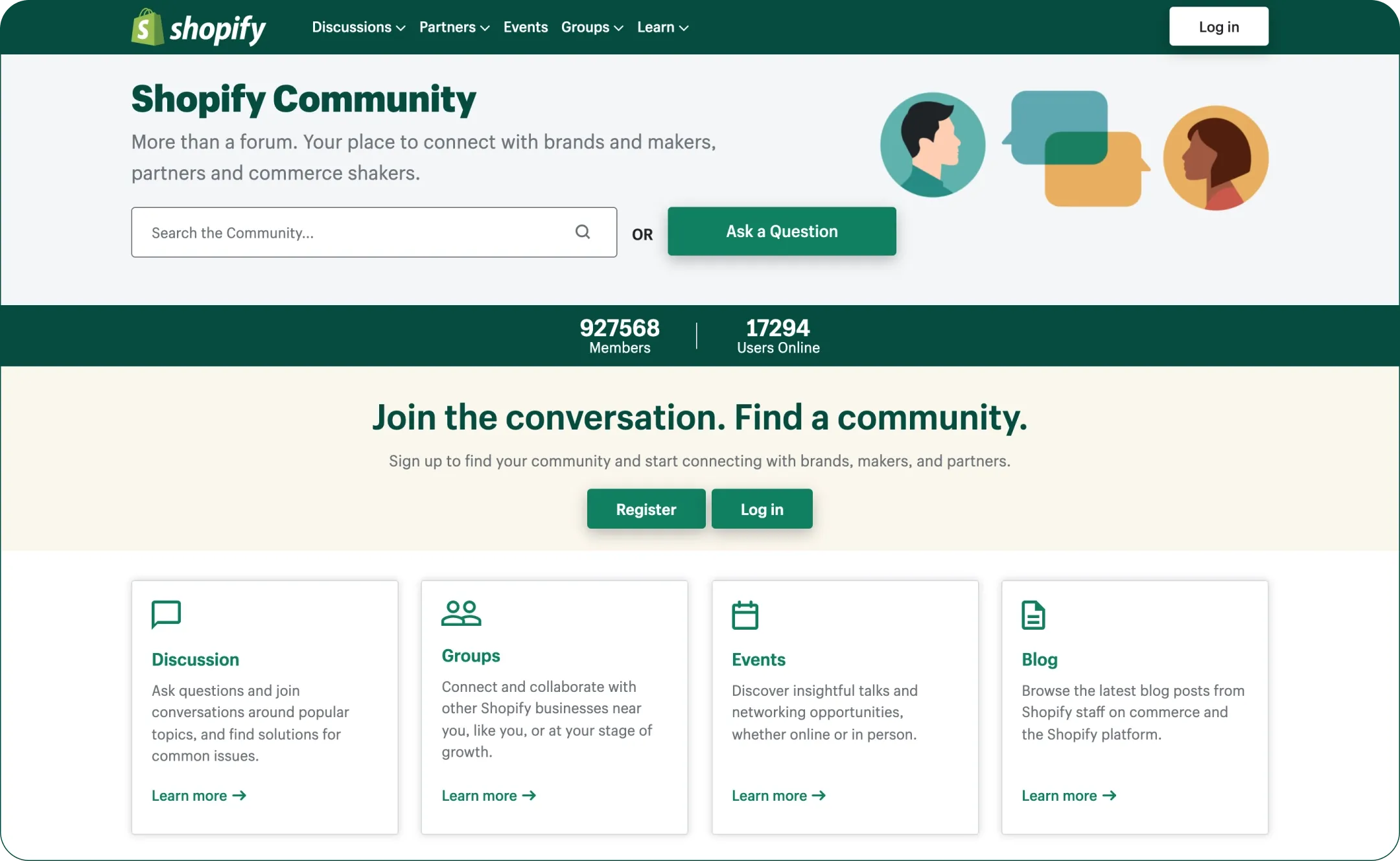
As for BigCommerce, this platform is rather young, but the community is already large enough to find answers quickly. The community is a useful option that helps to share experiences and discuss pain points with other users or developers. Shopkeepers can ask their questions, find answers to their issues, and participate in discussions.

In addition, the service of both platforms involves informing their customers about new products and the latest updates that have appeared or will appear in the near future. This will help you to keep your finger on the pulse and introduce new market-oriented solutions.
However, sometimes you can face challenging matters and need a consultation of an experienced developer. In our article “How to Create a Successful E-commerce Store?”, you will find many interesting facts about how to create a stable e-store that allows you to have competitive sales and stand out against the background of competitors.
Support
Support is a useful tool that provides help and necessary information on all the features available on the platforms. You can find reliable online support on both platforms: 24/7 customer help, an online chat, and a customer support team by e-mail are available at BigCommerce and Shopify.
Platform employees are always ready to solve user problems. You will be able to contact BigCommerce or Shopify staff directly and receive advice on the questions you are interested in or learn about upcoming webinars that are held every month.
On a BigCommerce e-commerce website, everything is customer-friendly, and the “Help” button is easy to find. The only important thing you need to remember is your PIN because there is no chance to use it without registration. Without a PIN you can’t write, call, or chat to support. You can also browse video tutorials of BigCommerce Support Center for more information about the available tools. There is an extensive Enterprise plan for priority support. If you use this plan, you will benefit from an additional priority in counseling. You will get a personal counselor who will be available 24/7 to handle all the support and business development issues.
Shopify provides 24/7 support to its clients and can get a personal consultant if you choose the most expensive tariff plan. For each tariff plan, such options as mail, live chat, or phone are available. Shopify has a very active forum where you can find an answer to almost any question. The chat or phone options can be easily found.
Shopify has many advantages and if you are ready to continue to get acquainted with it, read our article “Benefits of Shopify for E-commerce Store Development”.
Is it easy to Use?
The Content Management System (CMS) of Shopify and BigCommerce is designed to meet customers' needs. First and foremost, both platforms use a straightforward content management system, modern website editor, and a clear dashboard. They are very similar in design and functionality. The dashboards have many tools and tips to simplify the usage.
Users find Shopify easier to use than Bigcommerce. With Shopify, adding products is as simple as filling out a quick form for each item. Plus, there are plenty of tips along the way, like this useful sales tip about comparing prices:
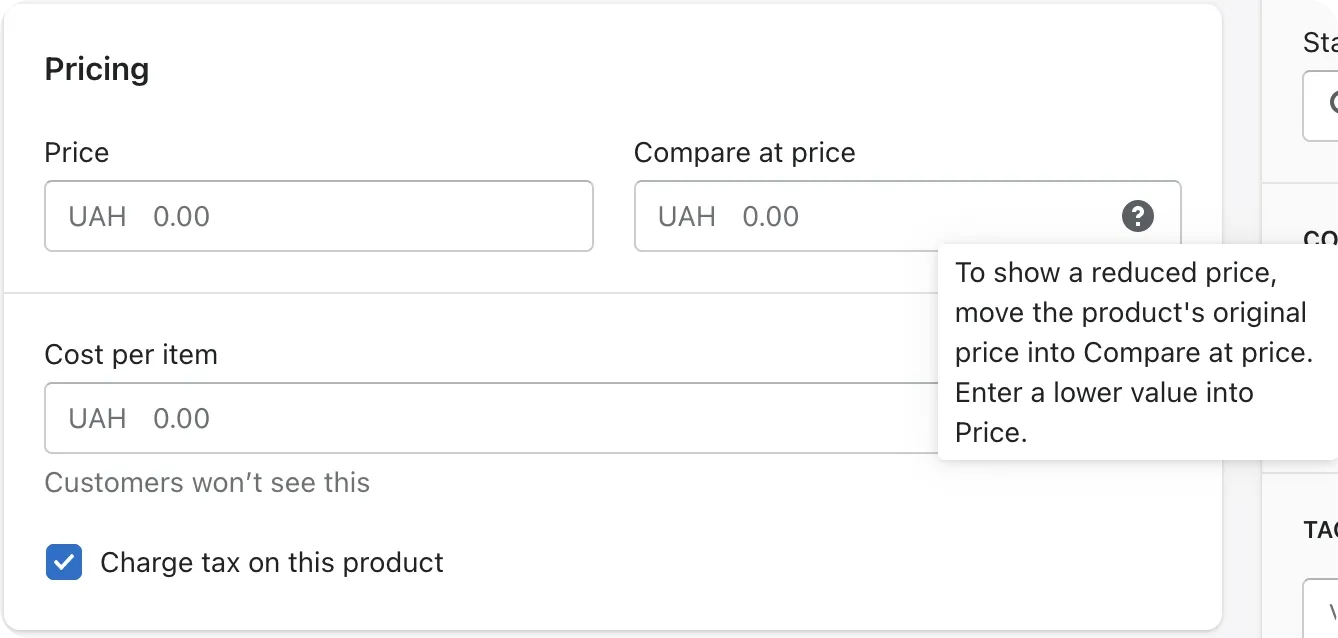
As of now, BigCommerce is considered not as friendly for beginners as Shopify. The point is that BigCommerce has a wide range of sales features that need some learning to provide a quick change in data:

As you can see, the above product information on the left side is highly important for customers and must be added for better categorization. Also, BigCommerce provides a set of page elements that can be added to any of your pages. You can simply choose it and drag it to the right place.

Using the Shopify dashboard, you don’t need much learning and can switch the design elements but you can’t drag it to the position you want.
Template design
An online store should look attractive on the front end, to encourage customers to buy on impulse. So what do Shopify versus BigCommerce offer?
Shopify design options
Shopify provides about 10+ free and payable themes. You can range your search by:
Layout;
Size of store;
Industry;
Navigation style.
Design attracts by its creativity and expressiveness and allows a high level of customization. Shopify’s design patterns for stores are something to be proud of. A nice onboarding tool will help you to do it step by step. All of them are highly adaptive for mobiles.
BigCommerce design options
BigCommerce also includes a catalog of diverse free and paid themes, divided into categories. You can filter your search by industry, layout, and price. However, if your business is growing very fast, you may face the need for additional rebranding, and move to a paid theme. Not all of the BigCommerce themes are customized for mobile devices.
Here you can find the BigCommerce gallery of existing user sites. Review them to make the right choice.
Free templates
Some templates design can be used for free, others are payable. There are 10 free topics on the Shopify platform and 12 free templates on the BigCommerce platform. Within these options, there are different variations to choose from, which means you have much more choices.
Visit Shopify site to easily come up with new ideas for your store!

A comparative Shopify vs BigCommerce review shows that BigCommerce’s themes are not as versatile in design as Shopify’s ones and can differ only by color. This is why there are some arguments that there are only five free themes.
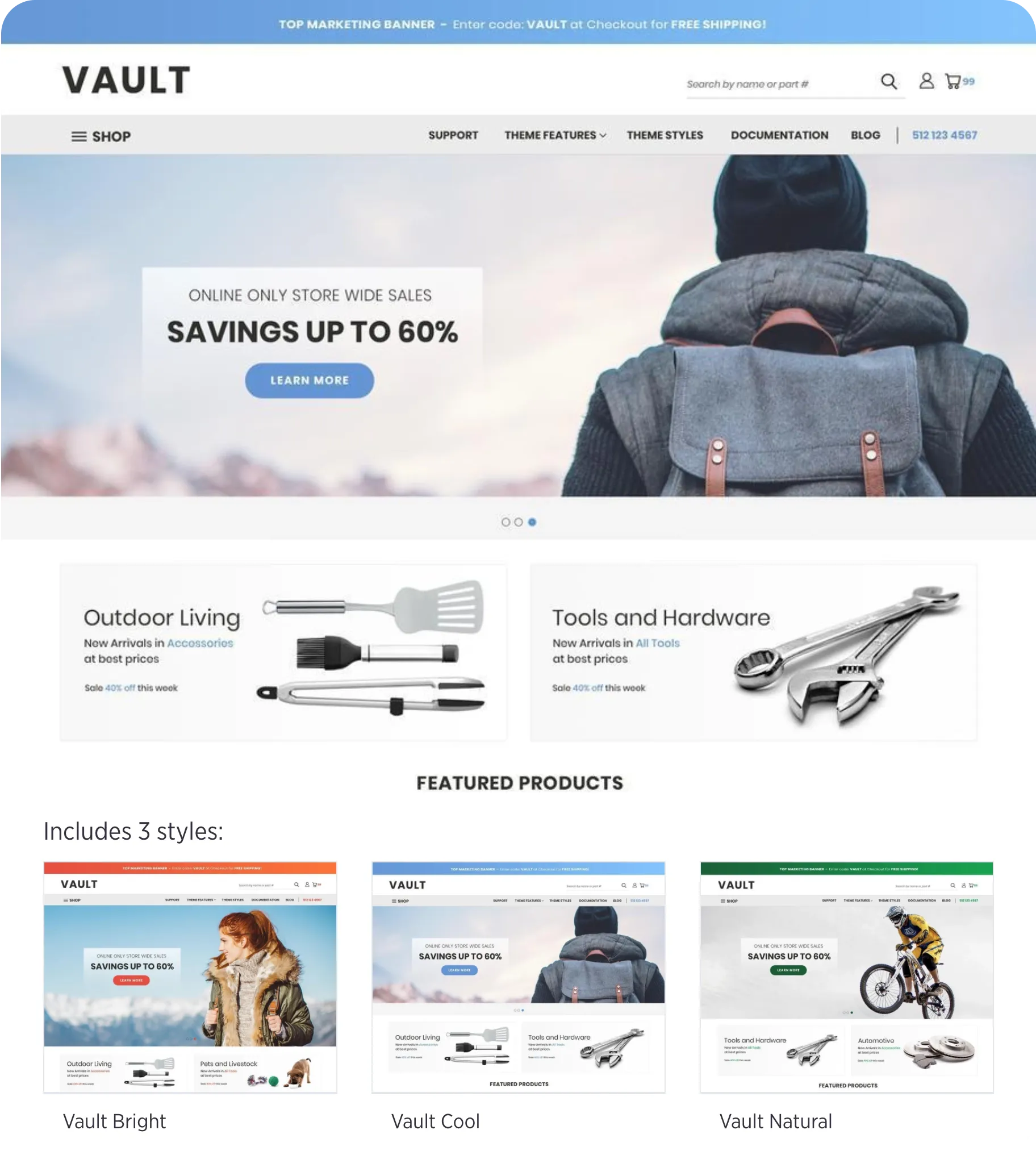
The interfaces of both BigCommerce and Shopify platforms provide drag-on-drop tools for easy theme management, but you will enjoy working on Shopify more thanks to more types of content blocks.
Different filters help users to find the necessary one. Design types are based on the industry type. They use video backgrounds, parallax scrolling, wide or narrow layout styles. In BigCommerce the fonts are part of the free themes and you just need to install the web fonts.
Paid Templates
You can choose Premium Themes through additional payment. There are 170 paid-for themes on the BigCommerce platform, their prices ranging from $150 up to $300. BigCommerce uses a discount system, so you can buy some of the themes at lower prices.

Shopify offers 71 paid-for themes at prices from $150 up to $350. It may seem that Bigcommerce has more variants available but in fact, you may see that they are just slightly different variants of the same theme. The Shopify template gallery is easy to browse and the templates offer more variety. You can use filters by industry type, catalog size, design type. If you compare, the design of Shopify’s templates is a bit stronger than that of BigCommerce.

If you still want better results, you need to edit HTML and CSS. It is very easy to do on both platforms thanks to their very user-friendly interfaces. If necessary, you can create your own theme from scratch by hiring a developer.
Top Sales Features
Both platforms provide a wide range of e-commerce options that are quite sufficient for regular use. Among them:

Both solutions provide great opportunities for online sales and an easy store start-up. You can hardly find any difference between the two platforms by these criteria. As platform developers monitor the needs of the market, the set of available options is constantly expanding and becoming available to users of either platform.
I would like to highlight the main thing: Shopify is more preferable for multilingual setups and has tools for dropshipping.
Marketing features
Marketing tools and functionalities are the key instruments in promoting your business. Let's look at what each platform has to offer in terms of marketing tools.
BigCommerce features
Email marketing is a very good way to promote your store. Considering this point BigCommerce provides a possibility to sync a store with a leading email marketing platform such as MailChimp.
Moreover, all BigCommerce sites use best SEO practices and provide URLs, title tags, header tags, and metadata. It’s also important when it comes to 301 redirects — a permanent redirect that passes full link equity, ranking power, to the redirected page. 301 redirects are automatically created if the name, the URL of a product, its category or a web page is changed.
Whichever BigCommerce plan you choose, you will get the following marketing features:
The ability to use Coupon Codes & Discounts helps to motivate your buyers to shop;
Easy Google Shopping integration allows you to expand your product's presence using Google tools;
Generated professional reports are used for analytical purposes;
Banners can be used for various advertising purposes, which attracting the attention of the audience and highlighting your main content;
Email Marketing with such options as MailChimp and G Suit enables you to send targeted messages and newsletters to avoid lost sales;
Social Media tools make it easy to present your brand on social media by adding “Buy Now” buttons on Pinterest, Facebook, and Twitter;
Abandoned Cart Recovery allows sending an automated email to customers to return them to purchase in case of а leaving without finishing a purchase.
Shopify features
Here is the list of Shopify marketing features:
Ability to apply the discount and gift cards;
Ability to automatically update the sitemap;
Automatic sitemaps, set custom headers and URLs;
Analytical product performance tools and finance statements.
Shopify’s basic plan allows you to analyze the performance of your store by individual categories of goods. However, if you want additional analytical data, for example, access to sales and profit reports, you need to switch to a better Shopify plan.
Shopify email provides you with ready-made templates which you can choose and apply easily. Using the custom layout, texts, buttons, and images you may personalize the templates in accordance with your demands.
Shopify SEO optimized by custom title tag and meta description configuration and combined with easy interface in every product and page editor. 301 redirect is also available while changes are provided.
BigCommerce and Shopify also have a built-in blog that is a highly effective tool for content marketing. It helps to promote the products, focus on your target audience and increase store traffic.
Summing up, both platforms have enough marketing tools to make your site visible on the market.
Data security
Both platforms, Shopify and BigCommerce, provide good security features for your data. You can add extra security to your data by adding a 2-Step Verification. Each time someone logs through another device and tries to get access to your account, you will get a warning letter. If necessary, you can then block your account until the situation is resolved. As cloud servers, both platforms encrypt all personal data and keep them private.
But there are some security restrictions for both solutions. It is not allowed to make additional security setting, according to the BigCommerce and Shopify security standards.
Payment plugins
Both platforms are equipped with payment plugins.
BigCommerce
You can find more than 65 pre-integrated gateways to choose from. Fees vary depending on payment card type and country. More information about fees you can find here. Among them are Amazon Pay, Paypal, Square, Stripe. You will benefit from having PCI compliance and mobile optimization.
The default payment option of BigCommerce is more beneficial than a third-party payment gateway. PayPal rates for credit card transactions depends on your pricing plan:

Additionally, you can use gateways in over 100 countries and provide payment in more than 250 local currencies. It gives your store a worldwide presence. Your customer will have a variety of payment options if you use the BigCommerce’s one-click setup.
When it comes to payment options, however, the sky's the limit: all major credit cards are accepted for payment. For customers who want to shop online but do not have a credit card (or don't feel comfortable using one), there are also unsecured credit card alternatives available that you can offer them. However, before adding these types of options into your store — as well as any other new or unfamiliar ones! — make sure you read complete reviews about unsecured cards so you won't get into trouble for offering them. Payment options are all mobile-optimized, providing additional advantages for your clients. In some countries, you will need to provide a payment system integration. All free BigCommerce topics provide automatic IP-based currency conversion. With BigCommerce your data will be highly protected by using built-in fraud protection tools and compliance options.
Shopify
As one of the leaders in the SaaS cloud solutions, Shopify is the only platform that provides its own ‘Shopify Payments‘ system to process card transactions. Shopify's payment service is quite functional. However, there is no possibility to use it in all countries, for some you need an external payment provider and building a payment integration system. Shopify connects with more than 100 other payment systems. They are easy to use in multiple countries and use different payment methods such as Stripe and PayPal. The main benefits of Shopify payment options are:
Instant setup and approval;
Full integration;
Wide scope of features
There are some payment fees that depend on the payment card type and plan you use. Shopify payments will be the following:

Conclusion: Pros and Cons of Each
In the battle BigCommerce vs Shopify there is no loser or winner. They are both strong competitors and either of them will bring you a wide range of benefits and high-quality services. Let’s sup up the pros and cons:
Shopify Pros
Easy addition of new sales features to your online store;
Possibility to get advanced support tools when choosing Shopify Plus and Advanced Shopify;
Abandoned cart recovery available at each plan;
A huge variety of plugin tools and extensions;
Quick assist upon demand, including Shopify Experts;
A secure way of managing your transactions;
Access to multi-channel sales system, inсluding social media and other platforms;
A 24-hour support.
Shopify Cons
Restricted scalable options: you need to integrate to third-party multi-currency apps;
To add some templates, you need to provide additional redesigning;
Blog features are not at the top-notch level;
URL structures aren’t best-suited for SEO;
Some of the tools, such as analytics, are available only in the Advanced plan.
BigCommerce Pros
Great online sales opportunities with built-in components;
Decent variety of SEO features for high-rank presence;
Customizable checkout models, letting to adapt every part of your checkout page;
Extensive multi-channel sales opportunities due to integrations.
BigCommerce Cons
There are some challenges in settings and support that take time;
There are annual sales limits, exceeding which leads to additional payments;
Editing interfaces can be difficult for beginners.
Choosing the best platform for an e-commerce website is really important for your business, as it automates manual work and frees up your time that you can spend on other business aspects. If you are ready to start building an online store and have made a decision which platform will best fit your need, contact us and we will help you to develop a scalable and data-driven store beyond competition.


























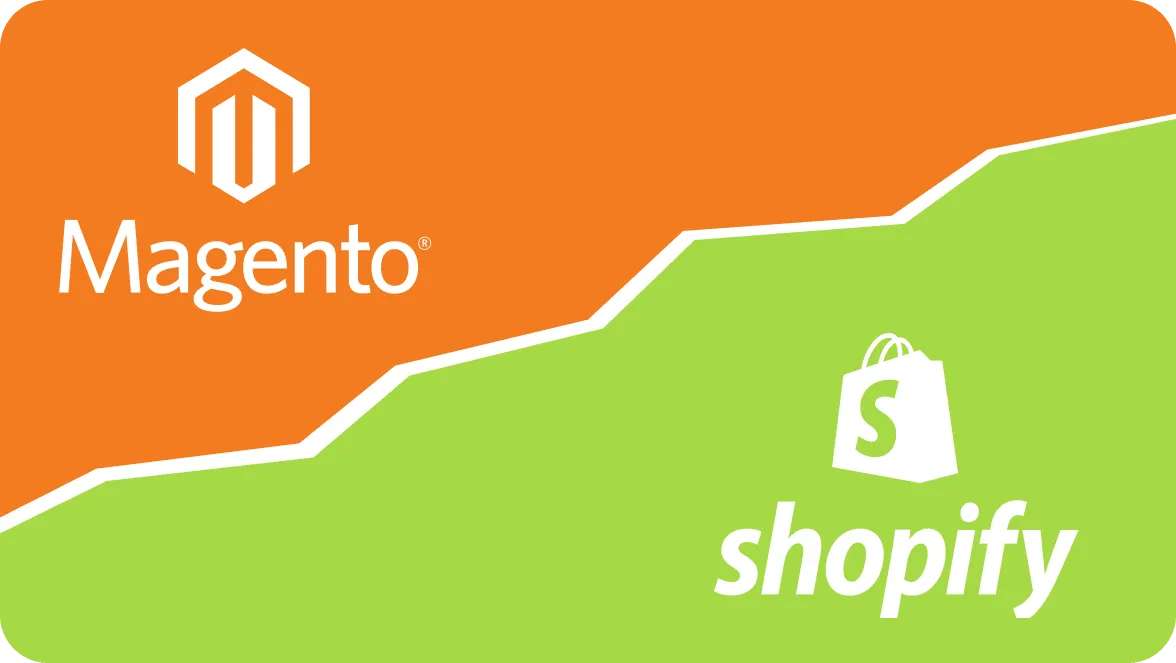


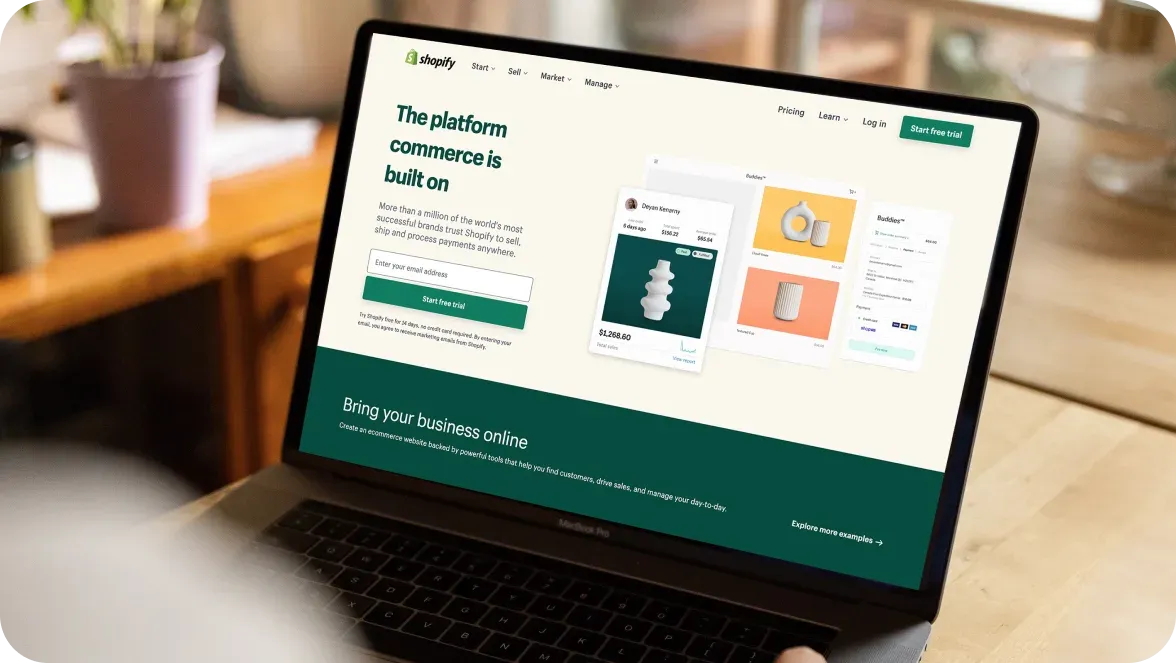



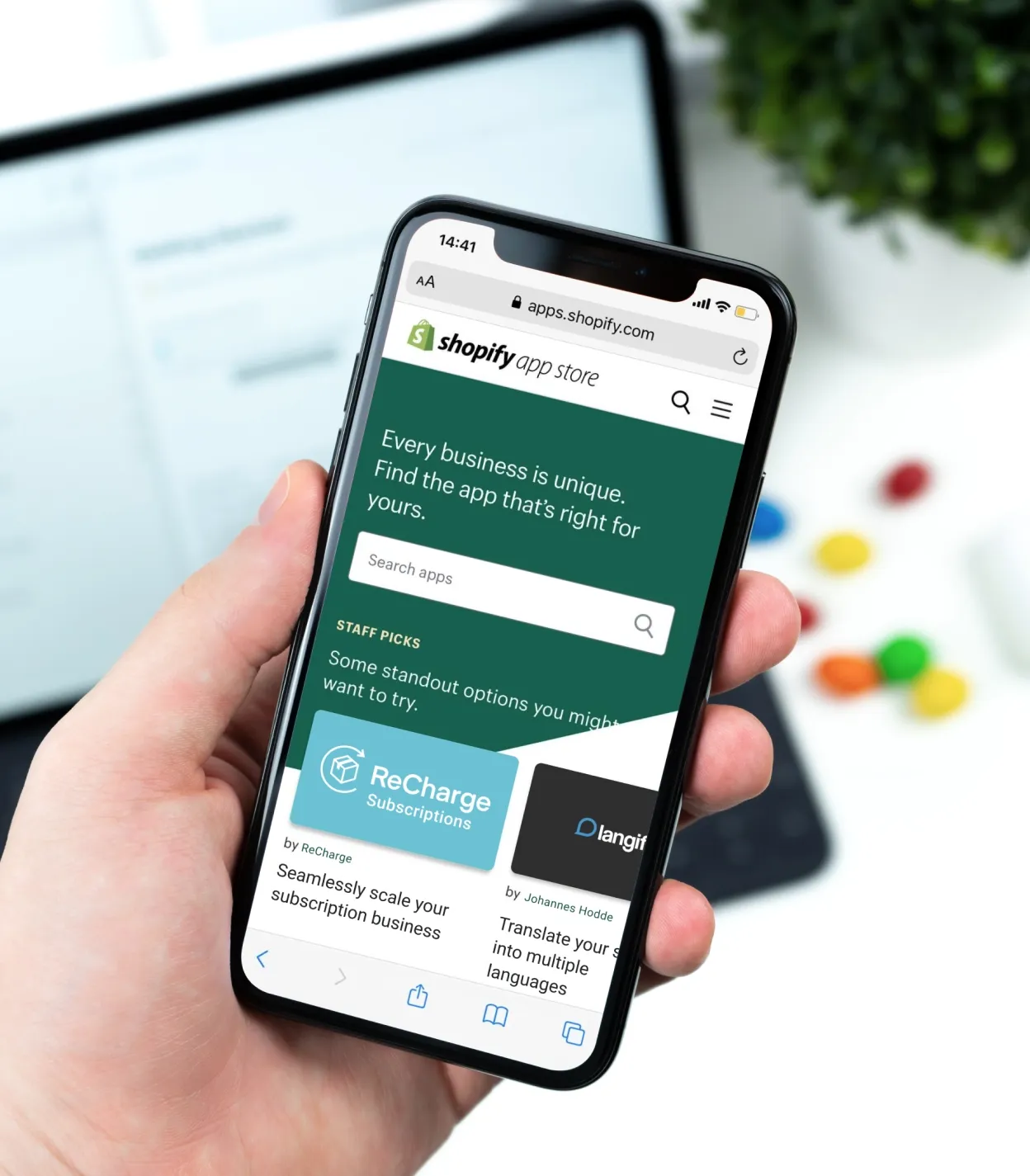



Was this helpful?
0
No comments yet